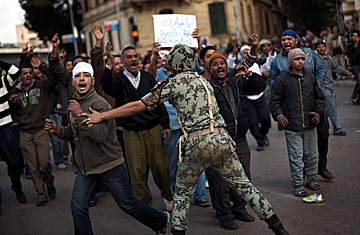
An Egyptian-army soldier tries to stop antigovernment protesters as they walk towards Tahrir Square in Cairo on Jan. 30, 2011
After dark in the middle of what everyone is calling a revolution, Cairo's streets become the the domain of men behind makeshift barricades set up in every intersection across the capital's warren of neighborhoods. The men are armed with metal pipes, sticks, machetes, kitchen knives and even belts — anything that might harm or dissuade looters and troublemakers from entering the parts of the city where they live.
The vigilantes sprung up a few days ago, after the police abandoned their posts en masse on Friday, leaving the city and its residents to their own devices. Although the military has deployed across Cairo, it is not vigorously manning checkpoints or examining vehicles. Rather, it seems to be more of a neutral observer, protecting the institutions of the state.
On Saturday, hundreds of stores were looted, damaged or destroyed in the city. The evidence was everywhere on Sunday morning: some areas looked like war zones with shattered glass littering the streets and still smoldering hulks that were once cars, some overturned, others driven into storefronts. Compounding the sense of insecurity, there were several jail breaks on Sunday that saw thousands of prisoners released back into the general population.
And so people are looking to protect themselves: stopping vehicles coming into their neighborhoods, asking drivers for ID, and checking cars for weapons or other contraband. "We are frightened for our families," says Mustafa, 56, who is armed with a metal pipe and standing guard at a checkpoint. "We just don't know what's going to happen or who is in charge."
After several days of protests, confusion seemed the order of the day on Sunday, the first day of the Egyptian work week. Schools remained shuttered as did banks and other institutions. At around 4 p.m. local time, the start of the curfew, two Egyptian fighter jets buzzed the crowd in Tahrir Square, in what was widely interpreted as a show of force. Or a show of support. But for whom? In the absence of official comment or instruction, Egyptians have been left to try and decipher events for themselves.
Neither President Hosni Mubarak nor his new vice president Omar Suleiman or his new Prime Minister Ahmed Shafik have issued any instructions to the people, although Mubarak was shown on state TV visiting a military command center on Sunday. At the same time, no clear voice has emerged from among the protesters to direct their energies.
For some, that voice should be Mohammad ElBaradei's. On Sunday night, the former head of the International Atomic Energy Agency made his way into Tahrir Square to address the thousands of demonstrators who remain there. But as he entered, pandemonium ensued and the Nobel laureate said little beyond repeating that Mubarak's regime must leave. His speech lasted only a few minutes.
"I came today to participate in the lives of Egyptians," he said. "Today you are an Egyptian demanding your rights and freedoms, and what we started can never be pushed back. We have one demand, the end of the regime and a new phase."
Although well-known in the West, ElBaradei doesn't even live in Egypt most of the time, residing in Vienna. He was introduced to the Egyptian electorate only last year amid an abortive presidential candidacy. He remains untested in local politics. Many people feel he has been out of the country too long, although even members of the Muslim Brotherhood concede that ElBaradei is a "good guy," a "clean man" according to a spokesman for the group on CNN. ElBaradei also taped a CNN interview earlier in the day with TIME's Fareed Zakaria. ElBaradei said, describing himself as a friend of America, that U.S. policy in Egypt had no credibility; and that the description of the Muslim Brotherhood as an organization of radical Islamists was a myth propagated by the Mubarak regime.
But for now the focus of protesters in Tahrir Square and elsewhere across the country is not what happens the day after Mubarak leaves office and who takes his place. It is still about trying to remove him. Hundreds of protesters spent the night in the square again on Sunday, in defiance of the curfew. They slep on the sidewalks, huddling close together to lessen the night's chill. One young man used a water bottle for a pillow. "I'm not leaving here," he told TIME, "until the president leaves." He may be sleeping out in the open for a while longer.
